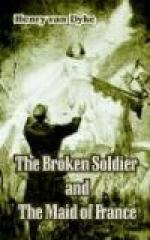“Well, then,” Pierre went on, his voice deepening and his face growing more tense, “then we were sent to Verdun. That was the hottest place of all. It was at the top of the big German drive. The whole sea rushed and fell on us—big guns, little guns, poison-gas, hand-grenades, liquid fire, bayonets, knives, and trench-clubs. Fort after fort went down. The whole pack of hell was loose and raging. I thought of that crazy, chinless Crown Prince sitting in his safe little cottage hidden in the woods somewhere—they say he had flowers and vines planted around it—drinking stolen champagne and sicking on his dogs of death. He was in no danger. I cursed him in my heart, that blood-lord! The shells rained on Verdun. The houses were riddled; the cathedral was pierced in a dozen places; a hundred fires broke out. The old citadel held good. The outer forts to the north and east were taken. Only the last ring was left. We common soldiers did not know much about what was happening. The big battle was beyond our horizon. But that General Petain, he knew it all. Ah, that is a wise man, I can tell you! He sent us to this place or that place where the defense was most needed. We went gladly, without fear or holding back. We were resolute that those mad dogs should not get through. ‘They shall not pass!’ And they did not pass!”
“Glorious!” cried the priest, drinking the story in. “And you, Pierre? Where were you, what were you doing?”
“I was at Douaumont, that fort on the highest hill of all. The Germans took it. It cost them ten thousand men. The ground around it was like a wood-yard piled with logs. The big shell-holes were full of corpses. There were a few of us that got away. Then our company was sent to hold the third redoubt on the slope in front of Fort de Vaux. Perhaps you have heard of that redoubt. That was a bitter job. But we held it many days and nights. The Bodies pounded us from Douaumont and from the village of Vaux. They sent wave after wave up the slope to drive us out. But we stuck to it. That ravine of La Cail-lette was a boiling caldron of men. It bubbled over with smoke and ’fire. Once, when their second wave had broken just in front of us, we went out to hurry the fragments down the hill. Then the guns from Douaumont and the village of Vaux hammered us. Our men fell like nine-pins. Our lieutenant called to us to turn back. Just then a shell tore away his right leg at the knee. It hung by the skin and tendons. He was a brave lad. I could not leave him to die there. So I hoisted him on my back. Three shots struck me. They felt just like hard blows from a heavy fist. One of them made my left arm powerless. I sank my teeth in the sleeve of my lieutenant’s coat as it hung over my shoulder. I must not let him fall off my back. Somehow—God knows how—I gritted through to our redoubt. They took my lieutenant from my shoulders. And then the light went out.”




